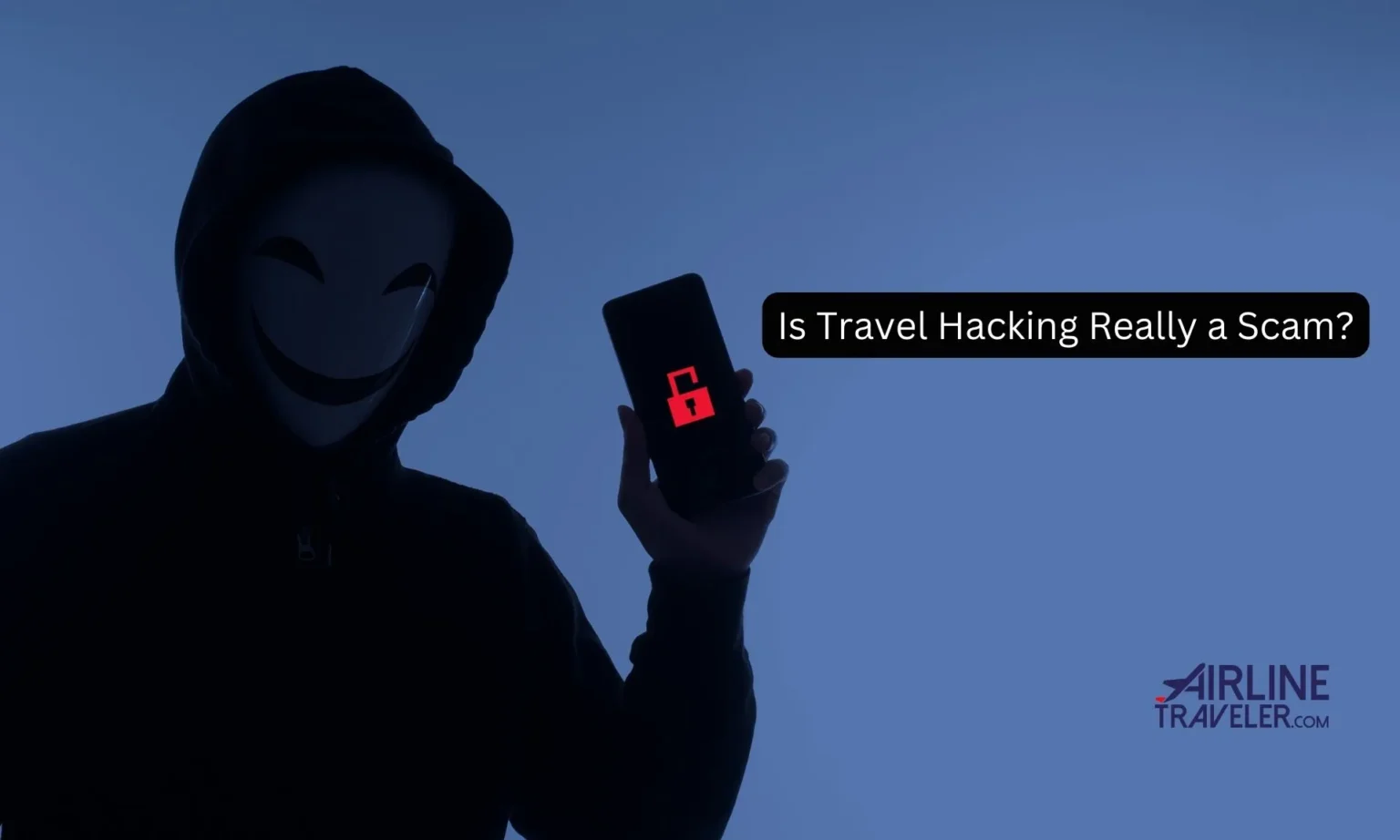Introduction
In recent years, the term “travel hacking” has garnered both fascination and skepticism, leaving many to ponder its legitimacy. As a strategy to score affordable flights, discounted accommodations, and other travel perks, travel hacking has become a popular concept among jet-setters and budget travelers alike. However, amid the allure of seemingly unbelievable deals and the promise of luxurious journeys for a fraction of the cost, some have raised concerns about the legitimacy and ethical implications of this practice. With varying opinions circulating, it’s crucial to address the question: Is travel hacking truly a scam?
At its core, travel hacking involves leveraging loopholes, promotions, and rewards programs offered by airlines, hotels, and credit card companies to minimize travel expenses. It often encompasses tactics such as exploiting frequent flyer miles, utilizing credit card points, and capitalizing on loyalty programs to obtain free or significantly discounted travel services. Despite its apparent appeal, numerous misconceptions and misconstrued notions have led to the vilification of this technique, casting doubt on its integrity and legality.
One common misconception surrounding travel hacking is the assumption that it involves fraudulent activities or deceitful practices. However, the reality is that legitimate travel hacking relies on astute financial planning, strategic spending, and an in-depth understanding of the intricate dynamics of loyalty programs. Travel hackers meticulously navigate the fine print of rewards schemes and promotional offers, adhering to the terms and conditions set forth by the service providers. By skillfully maximizing the benefits offered by these programs, they can unlock substantial savings without resorting to any form of illicit or dishonest behavior.
Moreover, critics often argue that the pursuit of travel hacking encourages reckless spending habits and excessive credit card use, leading to financial instability and debt accumulation. While it is true that mismanagement of credit card usage can result in adverse financial consequences, responsible travel hacking emphasizes prudent financial management, disciplined spending, and timely repayment of debts. Travel hackers meticulously plan their expenditures, leveraging credit cards for strategic purposes and taking advantage of their rewards programs without falling into the trap of overspending or accruing unmanageable debt.
Additionally, some skeptics claim that travel hacking devalues the travel industry and compromises the integrity of loyalty programs, ultimately leading to a decline in the quality of services and benefits for regular travelers. However, proponents argue that travel hacking encourages healthy competition within the industry, prompting service providers to enhance their offerings and improve customer experiences to retain their loyalty. Rather than undermining the industry, travel hacking fosters a symbiotic relationship between consumers and service providers, incentivizing the latter to innovate and offer more attractive incentives to retain their customer base.
The notion that travel hacking is a scam is a misconception fueled by misinformation and skepticism. When practiced with diligence, responsibility, and ethical considerations, travel hacking can be a legitimate and effective method for travelers to enjoy cost-efficient journeys and explore new destinations without straining their budgets. By understanding the intricacies of loyalty programs, exercising financial prudence, and adhering to ethical principles, travelers can reap the benefits of travel hacking while maintaining their financial well-being and contributing to a thriving and competitive travel industry. As the travel landscape continues to evolve, debunking the myths and embracing the truths behind travel hacking is imperative for fostering informed and responsible travel practices.
READ ALSO: Are Cheap Flight Websites Worth Using?
Navigating the Ethics of Travel Hacking: Promoting Responsible Practices and Transparency

While the benefits of travel hacking are undeniable, it is crucial for enthusiasts to uphold ethical standards and promote transparency within the travel community. As travelers delve into the realm of travel hacking, several ethical considerations must be emphasized to ensure the integrity of the practice and preserve the mutual trust between consumers and service providers.
First and foremost, travelers should prioritize adherence to the terms and conditions outlined by loyalty programs and promotional offers. Respecting the guidelines set by airlines, hotels, and credit card companies is imperative to maintain the sustainability of these programs and prevent any potential misuse or exploitation. By honoring the rules and regulations, travelers can cultivate a relationship of trust and reliability with service providers, fostering a more conducive environment for mutually beneficial partnerships.
Furthermore, transparency is paramount in the realm of travel hacking. It is essential for practitioners to openly communicate their methods and strategies, enabling fellow travelers to make informed decisions and embrace responsible practices. By sharing valuable insights and experiences, travelers can collectively contribute to a culture of transparency, empowering others to navigate the intricate landscape of loyalty programs and maximize their travel savings ethically.
In parallel, fostering financial literacy and promoting responsible spending habits within the travel community is integral to the sustainable practice of travel hacking. Educating individuals about the importance of prudent financial management, the implications of credit card usage, and the significance of debt avoidance can fortify the ethical foundation of travel hacking, ensuring that enthusiasts approach this practice with a sound understanding of its financial implications and the associated risks.
Additionally, advocating for fairness and inclusivity within loyalty programs is essential to prevent any form of discrimination or biased treatment among travelers. Encouraging service providers to offer equitable opportunities and accessible benefits to a diverse range of travelers fosters an environment of equality and inclusiveness, aligning with the ethical principles of integrity and fairness within the travel industry.
Ultimately, embracing ethical travel hacking practices serves as a catalyst for fostering a culture of accountability, transparency, and mutual respect within the travel community. By upholding ethical standards, promoting transparency, nurturing financial literacy, and advocating for fairness, travelers can contribute to the sustainable growth and positive evolution of the travel industry, ensuring that the benefits of travel hacking are enjoyed responsibly and ethically by all enthusiasts.
READ ALSO: Common Travel Scams And How To Protect Yourself and Your Belongings
Key Considerations for Embarking on Travel Hacking

For travelers intrigued by the concept of travel hacking, understanding several key considerations can significantly enhance their journey and ensure a seamless and rewarding experience. By prioritizing these essential factors, individuals can navigate the realm of travel hacking with confidence and make the most of the available opportunities and benefits.
Research and Due Diligence: Before delving into the world of travel hacking, conducting thorough research and understanding the intricacies of various loyalty programs, credit card rewards, and promotional offers is crucial. Familiarizing oneself with the terms and conditions, redemption options, and limitations associated with different programs can empower travelers to make informed decisions and maximize their savings effectively.
Financial Responsibility: Practicing financial prudence and responsible spending habits is imperative when engaging in travel hacking. Establishing a budget, monitoring expenses, and avoiding unnecessary debt are essential practices that safeguard one’s financial stability and prevent any adverse repercussions that may arise from irresponsible credit card usage or overspending.
Diversification of Loyalty Programs: To optimize the benefits of travel hacking, diversifying loyalty programs and strategically accumulating points across multiple platforms can broaden the spectrum of available rewards and enhance the flexibility of redemption options. By spreading loyalty across various airlines, hotels, and credit card companies, travelers can access a wider range of travel perks and maximize their savings potential.
Strategic Timing and Flexibility: Flexibility in travel dates and destinations can significantly amplify the value of travel hacking. Being open to adjusting travel plans based on promotional offers, off-peak seasons, and flexible redemption options can unlock additional savings and enable travelers to capitalize on exclusive deals and discounts, thereby optimizing their overall travel experience.
Security and Privacy: Safeguarding personal information and financial data is paramount when engaging with various loyalty programs and online transactions. Prioritizing the use of secure networks, employing robust password protection, and remaining vigilant against potential fraudulent activities are essential measures that ensure the security and privacy of sensitive information throughout the travel hacking journey.
Long-Term Value Assessment: Evaluating the long-term value proposition of loyalty programs and credit card rewards is crucial for sustainable travel hacking practices. Considering the redemption options, blackout dates, and the overall return on investment for accumulated points or miles aids travelers in determining the most beneficial and sustainable approach to maximize their travel savings and rewards.
By embracing these key considerations, travelers can embark on their travel hacking endeavors with a comprehensive understanding of the intricacies and nuances of loyalty programs, credit card rewards, and promotional offers. Equipped with this knowledge, they can navigate the landscape of travel hacking with confidence and efficiency, unlocking an array of travel benefits and experiences while upholding ethical and responsible practices throughout their journey.
Frequently Asked Questions About Travel Hacking
Is travel hacking legal?
Travel hacking, when conducted within the bounds of loyalty program terms and conditions and without engaging in fraudulent activities, is a legal practice. By adhering to the rules set forth by airlines, hotels, and credit card companies, travelers can ethically leverage rewards and promotional offers to minimize travel expenses.
Can travel hacking negatively impact credit scores?
When practiced responsibly, travel hacking is unlikely to have a significant negative impact on credit scores. However, it is essential to maintain timely payments, monitor credit utilization, and avoid accumulating excessive debt to safeguard one’s credit health and financial stability.
Are there any risks associated with travel hacking?
While travel hacking presents numerous benefits, certain risks, such as potential data breaches, fraudulent activities, or limited availability of rewards, may arise. Mitigating these risks through vigilant monitoring, secure online practices, and thorough research can help travelers navigate the landscape of travel hacking more effectively.
How can one start with travel hacking?
Initiating the travel hacking journey entails understanding the fundamentals of loyalty programs, credit card rewards, and promotional offers. Conducting thorough research, selecting reputable programs, and strategically planning travel goals can serve as a solid foundation for individuals seeking to embark on their travel-hacking endeavors.
Can travel hacking be sustainable in the long term?
Sustainable travel hacking practices involve responsible financial management, consistent adherence to loyalty program guidelines, and a comprehensive understanding of the evolving travel landscape. By diversifying loyalty programs, prioritizing ethical practices, and evaluating the long-term value of rewards, travelers can sustainably leverage travel hacking to optimize their travel experiences over an extended period.
How can one ensure the security of personal information while travel hacking?
Prioritizing the use of secure networks, implementing robust password protection, and remaining vigilant against potential online threats are vital measures to safeguard personal information and financial data during travel hacking. Utilizing reputable and secure platforms and regularly monitoring account activities can bolster the overall security of travel hacking practices.
Concluding Remarks: Embracing the Benefits of Responsible Travel Hacking
As the realm of travel continues to evolve, travel hacking remains a viable and advantageous approach for travelers to unlock a world of affordable opportunities and enriching experiences. By dispelling the myths, embracing ethical principles, and prioritizing responsible practices, individuals can harness the full potential of travel hacking while upholding integrity, transparency, and financial prudence.
Through diligent research, strategic planning, and a comprehensive understanding of loyalty programs and credit card rewards, travelers can navigate the intricate landscape of travel hacking with confidence and efficiency. By prioritizing ethical considerations, promoting transparency, and fostering financial literacy, enthusiasts can contribute to a sustainable and thriving travel community that values fairness, inclusivity, and mutual trust.
As travelers embark on their journeys, it is imperative to approach travel hacking as a transformative and empowering tool that enriches travel experiences without compromising financial stability or ethical standards. By upholding the key considerations, addressing common concerns, and fostering a culture of accountability and transparency, individuals can fully embrace the benefits of travel hacking, creating a pathway to memorable adventures and meaningful connections across the globe. Embrace travel hacking responsibly, and let the wonders of the world become more accessible and enriching than ever before.
In another related article, Common Solo Travel Fears and How to Overcome Them







